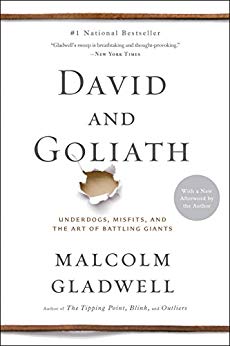

This article is an excerpt from the Shortform summary of "David and Goliath" by Malcolm Gladwell. Shortform has the world's best summaries of books you should be reading.
Like this article? Sign up for a free trial here .
What are desirable difficulties? Are all difficulties desirable?
Desirable difficulties are so-called disadvantages that can actually be strong advantages. They build resilience and make you seek surprising strengths despite having the difficulties.
We’ll cover three desirable difficulties — disability, tragedy, and having nothing — and look at why these difficulties may make you stronger than you would have been without them.
Desirable Difficulties
Consider these three “desirable difficulties”: disability, tragedy, and having nothing. What makes these, or any difficulties, desirable?
- Not all difficulties are desirable—the students in the bottom third of an elite college do not benefit from feeling demoralized and discouraged from pursuing their dreams.
- On the other hand, not all difficulties (what we perceive as disadvantages) should be avoided. For instance, making a task more difficult can actually increase your chances of success in it.
An experiment involving the Cognitive Reflection Test (CRT) demonstrates the advantages of a desirable difficulty. The CRT is the shortest intelligence test in the world at three questions long. At Princeton, researchers first gave the test to students in clear, standard font and print size. Students scored an average of 1.9 correct answers out of three. The second time researchers gave the CRT to Princeton students, they printed the test in hard-to-read font that was 10% gray. The average score increased from 1.9 correct answers to 2.45.
Yes, CRT scores increased when researchers made the test more difficult. How can this be?
- When a task is more obviously difficult and frustrating, you slow down.
- You think more deeply about the task and devote more of your mental resources on it. In essence, you think harder.
This is the power of desirable difficulties: They make life harder, but they allow you to get more out of life as you confront them.
Desirable Difficulty #1—Disability
One desirable difficulty is disability (or deficiency). When we are deficient in a skill area that most people depend on for success, we will only succeed if we find a way to compensate for our deficiency. We may compensate so well that our skills are more impressive than if we didn’t have the disability in the first place.
Capitalization Learning versus Compensation Learning
Most of our learning can be roughly divided into two types:
- Capitalization learning is the type we do when we get better and better at the things we’re naturally good at because we enjoy doing what comes naturally and easily. We capitalize on our strengths.
- If you sing well and have perfect pitch, you will likely join a choir.
- Compensation learning is the type we do when we need to compensate for a crucial skill we lack. This is learning out of necessity.
- Schools put a premium on the written word. If you have severe dyslexia and struggle to read, to succeed you need to develop abilities that compensate for your inability to read.
It’s not a given that someone with a deficiency in one area will automatically compensate for it by developing extraordinary talents in another area. But those that can do this are better off than they would be if they didn’t have the deficiency, because compensation learning (gained through struggle) is more powerful than capitalization learning (which is relatively easy). The desirable difficulty of deficiency is only desirable if we compensate for it.
Dyslexia: For Some, a Desirable Difficulty
A surprisingly high percentage (one study says ⅓) of successful entrepreneurs and business leaders are dyslexic. Are they successful in their careers despite their dyslexia or, perhaps, because of it?
People with dyslexia often compensate by developing other skills, including memory, observation, and summarizing skills.
For instance, David Boies is one of the most successful trial lawyers in the world. But he didn’t learn to read until he was in 3rd grade, and even today, he reads slowly and poorly. Boies credits his dyslexia (undiagnosed when he was young) for his amazing abilities in memorization, listening, observing, and distilling key points. He had to get really good at all these skills to compensate for the fact that he couldn’t read well or quickly. For Boies, dyslexia turned out to be a desirable difficulty.
Other people with dyslexia compensate in different ways. Movie producer Brian Grazer became skilled at the art of persuasion. Grazer’s dyslexia caused him to struggle in all his high school and college classes (which are usually text-based). After he received a grade, he’d go to the teacher and convince him or her to raise his grade by one letter. He says this worked 90% of the time. Grazer learned to negotiate out of necessity. This was good training for his eventual career as a movie producer.
A note on dyslexia and success: Many people with dyslexia never learn to effectively compensate for their inabilities. A high proportion of prison inmates have dyslexia. Only when we can learn from our difficulties and overcome the failures they produce do they benefit us.
Desirable Difficulty #2—Trauma
The second “desirable difficulty” is trauma.
Courage is not innate; it is something you have to earn. You earn it by surviving something you didn’t think you could survive, or confronting a fear and realizing it’s not as scary as you expected.
Because it can result in courage, trauma actually leaves some people better off than they were before. How does this work?
- If the worst has already happened, you’re freed of fear to some extent. Nothing will ever be as frightening as the realization of your worst fear (an event you somehow survived).
- Overcoming fear leads to a confidence you couldn’t have earned without it. You endure the seemingly unendurable, and then you know you can live through it. It gives you a sense of your own invincibility and power.
Trauma Strengthens Some People and Weakens Others
We tend to believe that trauma affects everyone the same way, and that this effect is universally negative. There are actually 3 general effects of trauma:
- Direct hits: These are people who don’t survive the traumatic event.
- For example, the casualties of the Blitz, Germany’s bombing campaign of Britain during the Second World War, were direct hits.
- Near misses: These are people who are close to the traumatic event, perhaps even witnessing it, but survive. Trauma weakens them.
- During the Blitz, these were the people who were wounded or saw the carnage. These survivors remained preoccupied with the horror of the Blitz long after it was over.
- Remote misses: These people are slightly more removed from the traumatic event. They experience it, but not quite as acutely as those in the “near miss” group. Trauma strengthens them–they benefit from the elation and relief of being spared.
- These were the Londoners who heard the sirens and the bombs exploding, and witnessed the ruins in their neighborhood. Most of the Londoners who lived through the Blitz were in this group.
- The Germans thought that by bombing London, they would destroy the courage of the Brits. In fact, the Germans created courage in a country that was previously scared. Surviving the bombing, Londoners gained self-confidence and realized that the bombing wasn’t as bad as they had anticipated.
Desirable Difficulty #3—Having Nothing (and Nothing to Lose)
The third desirable difficulty is having nothing to lose.
In a fair world, everyone could follow the conventional rules of the game and win. In the world we have, perpetual underdogs occasionally need to break the rules to succeed. To do so, they need to be “disagreeable” in the sense that they can’t care what others think.
If you have an abundance of wealth, status, and material goods, you risk all of it when you play by your own rules rather than society’s. You’re constrained. You have everything to lose.
But if you have very little and you’ve been neglected (or worse) by society, you don’t have anything to lose by bucking tradition and going your own way. This gives you freedom that those with more to lose don’t have.
The American Civil Rights Movement and Desirable Difficulty
When the conventional way doesn’t work, try something unconventional. For instance, the leaders of the American Civil Rights Movement had to play by their own rules with Project C because society’s didn’t work for them.
Martin Luther King, Jr., and many Civil Rights activists, came from a community that had been enslaved and oppressed for hundreds of years. Being an underdog community for centuries was a clear disadvantage to its members. But it also taught them how to operate as underdogs and win. African Americans were not respected by the societies they sought to transform. They couldn’t lose a respect they never had. This made them freer in their strategies than their opponents.
Walker devised a plan for Birmingham called Project C (“C” for confrontation). The success of Walker’s plan depended on getting Bull Connor to fight back. The hope was that if they could get Connor to blatantly mistreat protesters, the news coverage would generate sympathy for the movement across the nation and in the government.
Connor didn’t want King’s marchers to cross into “white” Birmingham, and he would do anything in his power to keep them from doing it. Walker and King knew this about Connor. They also knew that Connor was itching for a fight. Walker’s plan was classic Brer Rabbit—figuring out what the enemy wanted more than anything and then using that knowledge to bait him.
Walker used the desirable difficulty of having nothing to lose to his advantage. He used many strategies that a community with more to lose wouldn’t have dared use: He organized marches with imaginary protesters and made Conner look bad by baiting him and getting him to jail children and turn the hoses and dogs on protesters.
One photographer snapped a picture of a dog lunging at a fifteen-year-old boy. It was a picture that turned the tide of the movement. Congress passed the Civil Rights Act of 1964 a year later.
How did they come up with these “tricks”?
- King, Walker, and their team had nothing to lose. They had few material goods and no dependable rights.
- They were also desperate. They had nothing else to use. Conventional tactics hadn’t worked, so tricks were their only option. They also turned out to be effective.
Perhaps morality is just a name for the rules that Goliaths play by. Walker didn’t have any other options. The conventional, “moral” ways were not effective against the white giant and his racism. If the world isn’t fair, are you required to play fair?
Walker said later that he had no choice when he resorted to using children in his marches. He pointed out that Bull Connor was not moral, and therefore couldn’t be fought using “moral” methods. Underdogs are not naturally tricky. They become tricky out of necessity.
These examples show how disadvantages can become desirable difficulties if you’re able to capitalize on them.
———End of Preview———

Like what you just read? Read the rest of the world's best summary of "David and Goliath" at Shortform . Learn the book's critical concepts in 20 minutes or less .
Here's what you'll find in our full David and Goliath summary :
- Why being the underdog can actually be an advantage
- Why you shouldn't be afraid of powerful giants
- Strategies to get an edge when you're overpowered






